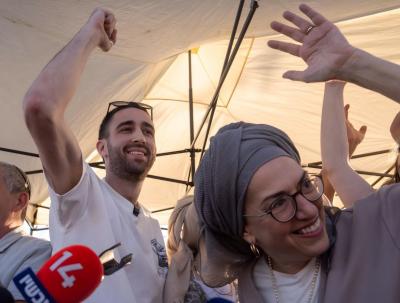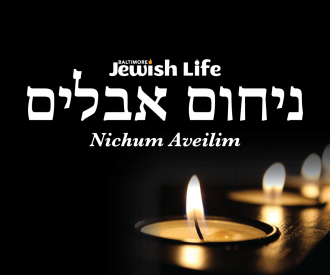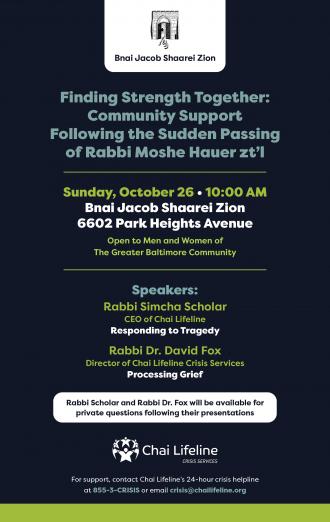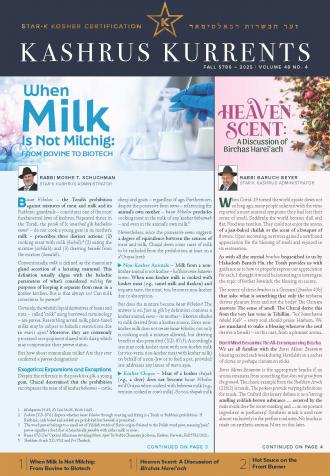Ditsa Or’s Unspoken Speech
The following text was never read aloud. Ditsa Or prepared it carefully and worked on it for a long time, but in the end—overcome by emotion, speeches, and embraces—she did not deliver these words.
Hostage Avinatan Or returned this week to the community of Shiloh, stopping at each station along the route where children and adults waited, overcome with excitement. For two years the Binyamin Regional Council has accompanied dozens of the fallen in silence and tears; standing on the same roadside and seeing someone come back from the abyss felt deeply healing.
Below is part of what Ditsa intended to say at the event:
“My brothers and sisters, ‘For this boy have I prayed,’” Ditsa began. “Just as thousands of years ago Chana prayed here in Shiloh for her son, Shmuel Hanavi, we prayed for this boy together. Our prayers were answered.
“For two years we wondered why we never received a video of Avinush,” she continued. “This week he told us the reason: every time they came to film him, he refused to cooperate, speaking in a low, monotone voice. He refused to be used to broadcast Hamas propaganda and prematurely end the war. We also heard about his desperate escape attempt from captivity—an operation that nearly succeeded. His head was already outside the tunnel, but at the last moment they grabbed his legs.”
These are only a few of the details now coming to light. Each of the twenty living hostages carries an astonishing, unique story of bravery.
“Avinush,” Ditsa continued, “the more isolated you were, the more we embraced you from here. That overflowing goodness reached you and strengthened you.”
It was reported that Avinatan lost three centimeters in height during captivity—his body had simply shrunk and weakened. He needs to regain strength now. By contrast, a neighbor of Ditsa’s told me she feels that Ditsa has added stature, straightening the posture of everyone who accompanied her through this period.
This is not only Ditsa’s story. Our tradition teaches that the Jewish people will be redeemed through righteous women. This week I watched released captive Yelena Trufanov (mother of released captive Sasha Trufanov), address about a thousand women at the community hall in Rehovot, and I heard Varda Ben Baruch, grandmother of released captive Idan Alexander, address some five hundred women at Yeshurun Synagogue in Jerusalem. Without coordination, both women returned to the same sacred, strengthening message: an intense frequency of unity and Jewish identity that only they seem to know and feel compelled to share. Observing from the side, I wondered what you would call this gathering: not a conventional lecture, not a performance—perhaps a ritual after which people leave a little taller. At the end, long lines formed as women waited simply to embrace them.
Near the end of her speech, Ditsa wrote: “We feel sharp pain and a special hardship today because of the families whose loved ones’s killers are now being released home under the deal. We will pursue them until we destroy them.
“And from here on, od yoter tov—better and better, until complete redemption.”
The Soul Illuminates
Rabbi Avraham Yitzchak HaKohen Kook wrote a short guiding sentence for each month of the year. This is what he wrote about the new month of Cheshvan that began last week:
“When the soul shines, even skies shrouded in fog radiate a pleasant light.”
Rav Kook offered this teaching specifically for Cheshvan — the onset of winter, the month that follows the spiritual heights of Tishrei and suddenly contains no holidays at all. It is a time when darkness settles earlier, the skies grow heavy and gray, and a long routine can bring with it a sense of dullness or gloom. Yet Rav Kook reminds us that if the soul is shining within, its light can transform even the thickest fog. With the power of the soul, even clouded skies can glow.
This insight also captures the reality of the past two years. We have witnessed how, even in a time of deep and overwhelming darkness, the soul of the Jewish people has continued to shine — and that light has shaped the world around us. In these very days, we are hearing the astonishing stories of some of the hostages. After two horrific years in the tunnels of Hamas, they returned with souls that still shone — radiating faith and hope in the face of terror and confusion.
And what is true of our nation is also true on a personal level. Each of us carries inner light. We do not need to rely solely on external circumstances to determine how we feel. When we choose to see the world through the light of the soul, the world reflects that light back to us.
The Courage to Stand Apart
I once heard a young man, stylishly dressed in the latest fashion, challenge another young man who was wearing traditional chassidic clothing: “Do you really believe that our forefather Avraham dressed like you — in black and white, with a hat like that?”
The chassid smiled and replied: “I’m absolutely certain Avraham did not dress like me. But I’m just as certain that he looked around at the fashion trends of his time — and then chose to wear the exact opposite.”
We are not commanded to dress in outdated or unfashionable clothing. But there is a truth hidden in that answer. In his time, Avraham Avinu was an outsider, a revolutionary, a man who stood apart from his surroundings. Today we admire him as a spiritual giant, but in his own generation he was viewed as a radical voice challenging the entire cultural order.
Rabbi Samson Raphael Hirsch, in his commentary on this parashah, emphasizes that Avraham is meant to instill in us the courage to stand as an alternative to the prevailing culture — and not be absorbed by it. This applies not only to global culture, but even to trends within Jewish society:
The isolation imposed upon Avraham placed him in total opposition to the spirit of his age. His values were the polar opposite of those around him. No one can claim, “I am righteous,” merely by meeting society’s standards. A person is answerable to God, not to the fashions of the moment. If the majority behaves in a way that is false, then one must serve God truthfully even if it means standing in the minority. Had we not inherited Avraham’s courage to be different, how could we have survived as a nation — then or now?
There are those who promote a “Judaism that keeps up with the times.” The very first command spoken to Avraham — “Lech lecha,” go forth — is the Torah’s strongest rebuttal to that idea. Avraham’s first steps on the stage of history were not in harmony with the cultural spirit of Babylon, Assyria, Sidon, or Egypt.
And so it is for us. To walk in the path of Avraham is to be willing to stand apart, to hold fast to truth even when it is unpopular, and to have the courage and faith to live by God’s call — not by the fashions of the moment.
The Truly Joyful Week
The book Hayom Yom teaches that every person should “live with the weekly Torah portion”—not only read it on Shabbat, but carry it with us throughout the week, allowing its messages and insights to influence our daily lives.
Two weeks ago, we began the book of Bereishit. It opened with joy—the creation of the world—but ended in sorrow: the sin of the Tree of Knowledge, the expulsion from Eden, and the murder of Hevel by his twin brother Kayin.
The second portion, Noach, began somberly—with a corrupt humanity and the devastation of the Flood—but concluded with joy: the birth of Avraham Avinu.
This week’s parashah, Lech Lecha, is known as “the truly joyful week,” for we spend these days in the company of Avraham and Sarah—figures we still call “our father” and “our mother.” Through their actions, their character, and their unwavering faith, they became Avraham Avinu and Sarah Imeinu, the first father and first mother of our nation.
This week’s portion teaches us about their kindness and their faith; about their remarkable tent, open wide in hospitality; about their mission to spread belief in God; and about their courage to stand against the majority and ultimately influence the world.
All of these qualities, they bequeathed to us. We are their continuation.
May we merit to feel the joy of this week!















